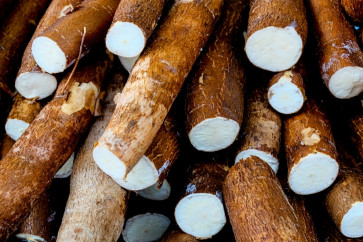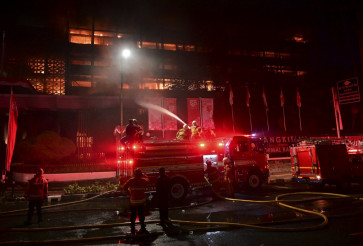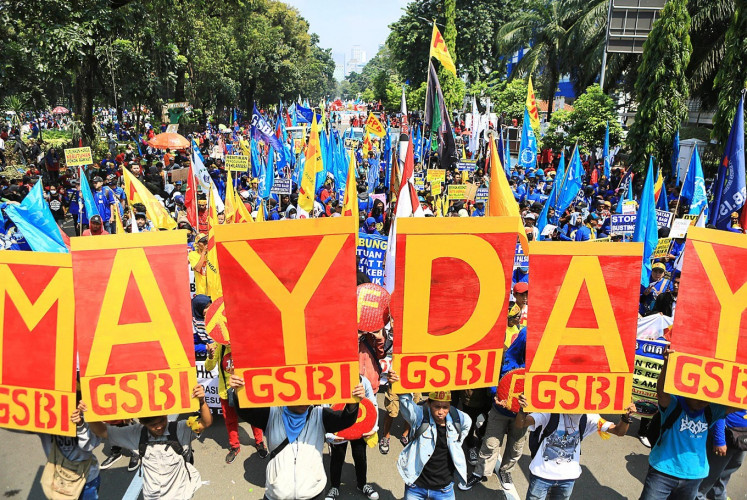Ethnic-based conflict continues to haunt West Kalimantan
Years after the serious conflicts that involved the Dayak people, Malays and Madurese in West Kalimantan, locals continue to struggle to overcome their differences
Change text size
Gift Premium Articles
to Anyone

Years after the serious conflicts that involved the Dayak people, Malays and Madurese in West Kalimantan, locals continue to struggle to overcome their differences.
Malays say they feel alienated and the Dayak people say they are not appreciated.
Chief Sgt. Heryanto is an officer at Sanggau Ledo police precinct, 350 kilometers northwest of West Kalimantan's capital Pontianak and he said he was angry because the law was powerless against "a bunch of local thugs and criminals".
He said "Dayak thugs" frequently demanded money from shop owners or visitors, including salesmen and tourists, to buy alcoholic drinks or to gamble.
"When they can't get the money, they just ruin the visitor's car or a business-owner's shop," Heryanto said. "We can't do anything about that.
"We had arrested some thugs but trucks of Dayak people came and attacked us so we had to release them."
Heryanto is Javanese and has worked in the area for 11 years. He said the police could not be tough on the thugs because they feared the widespread social tension and misunderstanding among ethnic groups in the area.
Syahrizal, a local businessman from Ngabang regency, said he also felt "discontent" toward Dayak people.
Several months ago, he said he paid Rp 48 million (US$5,275) in compensation to the Dayak community, as per one of their customs, after his son drove over one of their members and killed him.
"I had to sell everything to satisfy the Adat (custom) as every part of the body -- from nails to hair -- was counted," Syahrizal said.
"If I did not pay the family, they threatened to burn my house and my family. Dayak people have become out of control," he said.
Tomy Agustinus, a Dayak truck driver from Benkayang regency, dismissed the allegations, accusing some Malays of being overly proud of their status as a Kalimantan "first-class group".
"They just want us to be forever in backwardness," he said. "When we are advanced, they are just jealous. Please give us a chance."
Prejudice is one of many long-standing issues between Malays and Dayaks and a series of deadly ethnic conflicts in late 1990s and early 2000 is still fresh in everybody's minds.
The 1999 war between Dayaks and Madurese in the towns of Sambas and Sampit in Central Kalimantan killed hundreds of people, mostly Madurese, while thousands fled to Java when the Dayak people took revenge on the migrant group.
Similar riots broke out in 1996 in West and Central Kalimantan between the Dayak community and the Madurese, leaving hundreds of people dead and thousands of others homeless after they were expelled from the provinces.
In Kalimantan, top political positions have always been dominated by ethnic-Malays, the majority ethnic group, with the Chinese minority occupying most economic activities.
The Dayaks are native to Kalimantan but are viewed as "second class citizens" and tend to stay inland or in forests.
The Madurese community is considered hard working and is employed in construction, road works and plantation operations.
Other smaller ethnic groups include Javanese, who came to the province with the New Order's transmigration program, and Bugis, who are mainly traders.
After Cornelis MH, a leading Dayak figure, and Cristiandy Sanjaya, a Chinese businessman, were elected as West Kalimantan governor and deputy governor respectively, disappointment has grown among Malay ethnic members.
There have been accusations officials from the Dayak community have been pushed into top positions in the gubernatorial offices and at regency and district levels.
"The Malays have lost top political positions because they didn't unite in the election, with three pairs running against each other," said Dedy Syahriansyah, a young ethnic-Malay businessman.
"I think the challenge for Cornelis is to prove his tendency to put Dayak people in top positions is not true. We hope he can apply a merit system as we can accept any ethnic as long as he or she is capable," he said.









